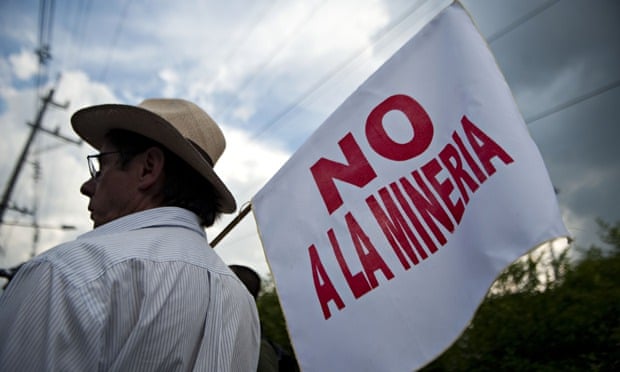Coalmining firm damned in report on lobbying that denounces private-sector’s role in climate negotiations, published in Lima to coincide with Cop20

In the report, the role of the private sector, particularly that of the coalmining company Anglo American, in intergovernmental negotiations to seal a binding agreement to cut greenhouse gas emissions is aggressively denounced. The report, How Corporations Rule: Anglo American’s dirty energy lobby and its false climate solutions (pdf), was released in Peru by Friends of the Earth International, the Transnational Institute (TNI) and the Corporate Europe Observatory. Previous reports by the group of NGOs investigated South Africa’s Sasol and Brazil’s Vale.
The authors have investigated Anglo American’s activities at South America’s largest opencast coalmine, Cerrejón, in La Guajira peninsula in Colombia, and its lobbying efforts at the UN Framework Convention on Climate Change.
Coalmining in Cerrejón began more than 30 years ago. The Colombian government sold its shares to Anglo American, BHP Billiton and Glencore Xstrata in 2000 and the three companies jointly own Cerrejón. Production totals 33m tonnes a year yet coal has not enriched La Guajira: almost 56% of the local population live in poverty, almost 26% in extreme poverty, according to official figures (pdf).
Local communities, indigenous people, African-Colombians and peasants have fought Cerrejón over control of land and water resources. According to the company’s figures, the mine uses 17m litres of water per day; the average personal consumption in Alta Guajira is 0.7 litres, says the report.
“This year, La Guajira suffered a prolonged drought of nine months,” said Lyda Forero, a researcher at TNI. “In our talks with the communities, we saw people had very scarce access to water, while the mine continued consuming, and drying up, the wells and sources.”
Cerrejón said it was aware of the scarcity in La Guajira and has created a Water Foundation to support permanent access to water. It said it took action to limit the impact of the drought, including repairing mills, providing tanks to store water in and delivering water directly to local communities.
Cerrejón said about 88% of the water it uses comes from the coal seams and from rain. Both sources are “low-quality water” and “cannot be used for either human or animal consumption nor for crops”.
The company has offered compensation to residents as part of a resettlementpackage. It has also set up other foundations to promote microbusinesses, support the sustainable development of the Wayúu indigenous people and create more transparent institutions.
However, not all families are benefiting, according to Forero; only some have received cash payments. Those who took the cash regret their decision, Forero said, because their lives have not improved and “they lost connection to their original lands, ancestors and traditions”. She argues that the government, instead of guaranteeing the population’s rights, has created a vacuum in which Cerrejón, through its foundations, has become the main policymaker.
Cerrejón recognised the controversy of the compensation packages, but argued that some families have benefited. It said: “A resettlement never is an easy process. We maintain permanent communications with all the communities we have resettled and those who are in process. There is no unanimity regarding resettlements and many communities and families have benefited from these programmes.”
It said the package offered by the company follows International Finance Corporation guidelines and comprises housing, education and health projects.
The report claims that the “green” projects have few benefits to the population and the environment. Between 2008 and 2011 there were no reductions in greenhouse gas emissions, according to Cerrejón’s own sustainability study (pdf).
The report also accuses Anglo American, which has investments in Brazil, Chile and Peru, of “spinning a web of influence” to ensure the longest possible future for coal production, a major source of greenhouse gases.
Anglo American’s media manager, Emily Blyth, said: “Coal plays a necessary role to support the developing world to access affordable energy.”
Anglo American is a member of trade associations and lobby groups, includingEuromines, the International Council on Mining and Metals, the International Energy Agency Clean Coal Centre, the UN Global Compact, the World Business Council for Sustainable Development and the International Chamber of Commerce, which enjoy privileged access to governments and advocate market-based mechanisms.
These mechanisms include the experimental geoengineering technology of carbon capture and storage – for which the industry is creating “CCS ready” coal and gas, the Reducing Emissions from Deforestation and Forest Degradation initiative and emissions trading schemes. Anglo American argued that its lobbying role is to support the uptake of such mechanisms, saying: “We engage with governments to inform policy for the effective uptake of new technologies.”
The report is calling on the UN to introduce measures to protect its institutions from the influence of the private sector. Businesses should not have privileged positions in negotiations and the role of the business and industry group should be limited, it says.
The UN should introduce a code of conduct for its officials, including a cooling off period during which former officials cannot work for lobby groups. The World Health Organisation set a global precedent against corporate lobbyists when it took action to ensure the tobacco industry had no role in public health policymaking, said the report.
It also calls for the UN Global Compact, a UN initiative to encourage sustainable business practice, to be dismantled. “All of what is being done is to ensure businesses have a greater voice at the table in climate talks and in all areas of environment and development,” said Corporate Europe Observatory campaigner Pascoe Sabido. “The Global Compact is at the core of the problem, not the solution. Businesses are not short of a voice. But it is not their solutions that will take us out of this mess, it is people’s solutions. And people’s solutions are what need to be seen.”
